Richer Sounds: Organisational Behaviour and Team Dynamics
VerifiedAdded on 2023/01/05
|13
|3624
|69
Report
AI Summary
This report provides a comprehensive analysis of organisational behaviour within Richer Sounds, a UK-based home entertainment retailer. The report investigates the influence of organisational culture, power dynamics, and office politics on individual and team behaviour and performance. It explores Handy's Model of Organisational Culture, French and Raven's bases of power, and the impact of positive and negative politics. Furthermore, the report examines effective versus ineffective teams, applying Tuckman's Team Development Model and Belbin's Team Roles to understand team dynamics and improve working practices. The report concludes by evaluating the concepts and philosophies of organisational behaviour, offering recommendations for improving Richer Sounds' organisational environment and enhancing productivity.
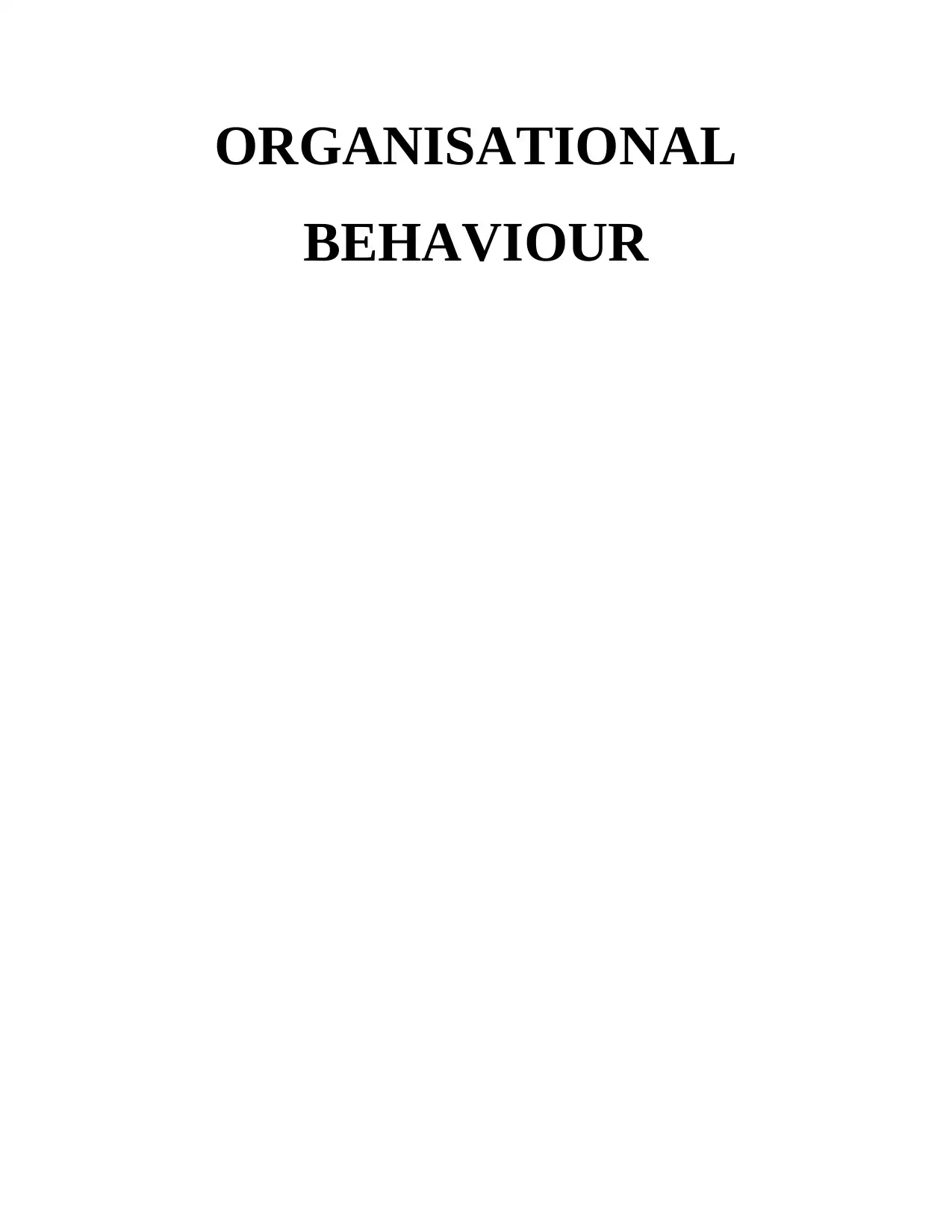
ORGANISATIONAL
BEHAVIOUR
BEHAVIOUR
Paraphrase This Document
Need a fresh take? Get an instant paraphrase of this document with our AI Paraphraser
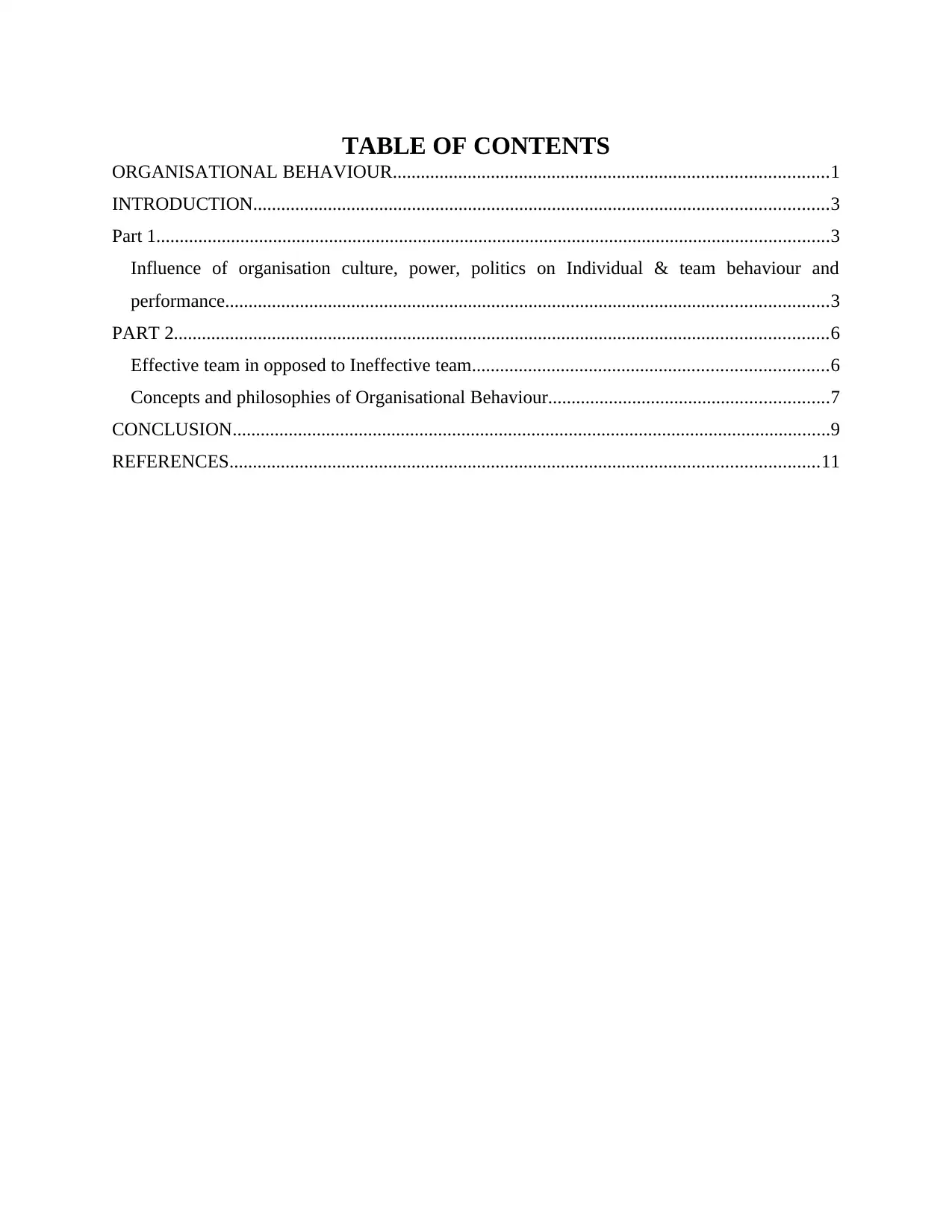
TABLE OF CONTENTS
ORGANISATIONAL BEHAVIOUR.............................................................................................1
INTRODUCTION...........................................................................................................................3
Part 1................................................................................................................................................3
Influence of organisation culture, power, politics on Individual & team behaviour and
performance.................................................................................................................................3
PART 2............................................................................................................................................6
Effective team in opposed to Ineffective team............................................................................6
Concepts and philosophies of Organisational Behaviour............................................................7
CONCLUSION................................................................................................................................9
REFERENCES..............................................................................................................................11
ORGANISATIONAL BEHAVIOUR.............................................................................................1
INTRODUCTION...........................................................................................................................3
Part 1................................................................................................................................................3
Influence of organisation culture, power, politics on Individual & team behaviour and
performance.................................................................................................................................3
PART 2............................................................................................................................................6
Effective team in opposed to Ineffective team............................................................................6
Concepts and philosophies of Organisational Behaviour............................................................7
CONCLUSION................................................................................................................................9
REFERENCES..............................................................................................................................11
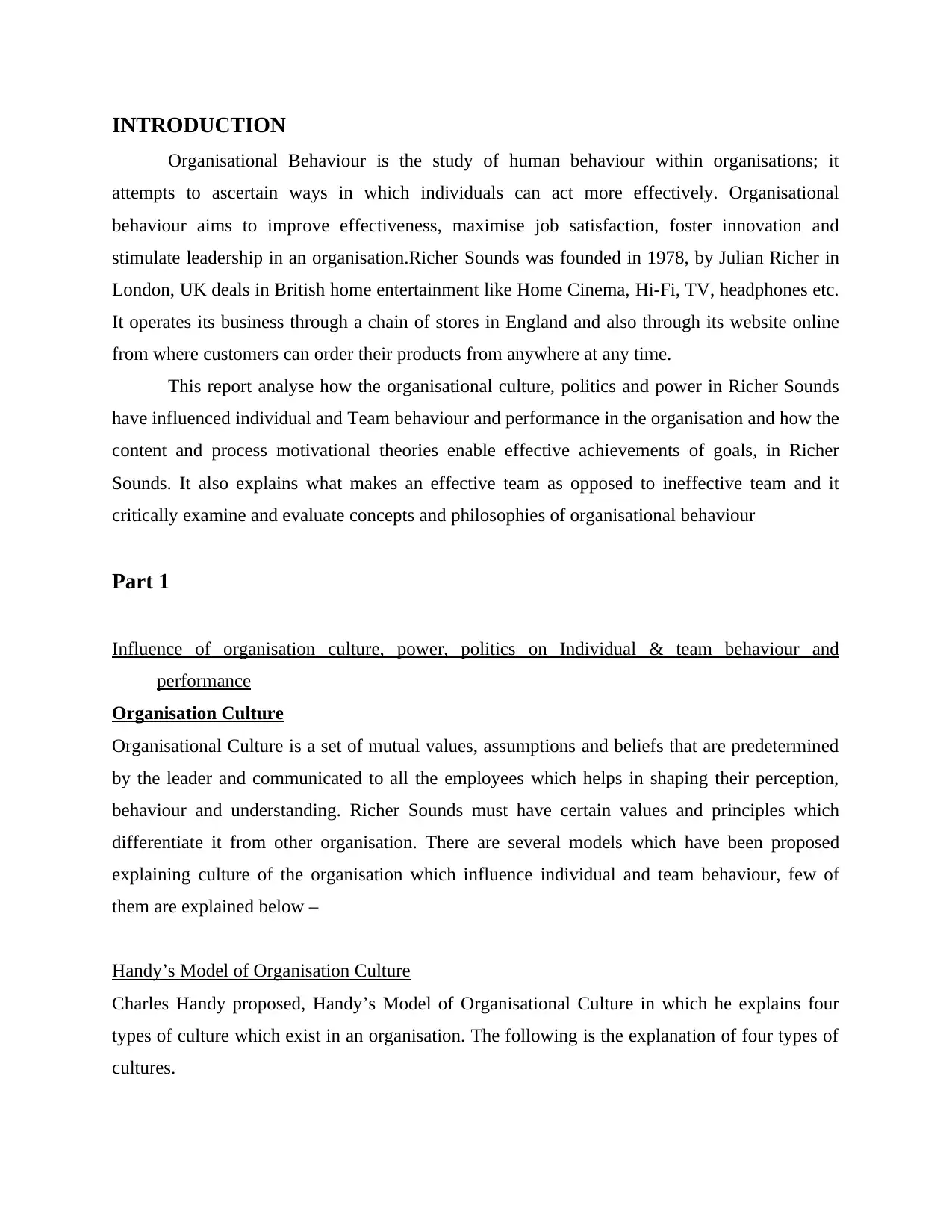
INTRODUCTION
Organisational Behaviour is the study of human behaviour within organisations; it
attempts to ascertain ways in which individuals can act more effectively. Organisational
behaviour aims to improve effectiveness, maximise job satisfaction, foster innovation and
stimulate leadership in an organisation.Richer Sounds was founded in 1978, by Julian Richer in
London, UK deals in British home entertainment like Home Cinema, Hi-Fi, TV, headphones etc.
It operates its business through a chain of stores in England and also through its website online
from where customers can order their products from anywhere at any time.
This report analyse how the organisational culture, politics and power in Richer Sounds
have influenced individual and Team behaviour and performance in the organisation and how the
content and process motivational theories enable effective achievements of goals, in Richer
Sounds. It also explains what makes an effective team as opposed to ineffective team and it
critically examine and evaluate concepts and philosophies of organisational behaviour
Part 1
Influence of organisation culture, power, politics on Individual & team behaviour and
performance
Organisation Culture
Organisational Culture is a set of mutual values, assumptions and beliefs that are predetermined
by the leader and communicated to all the employees which helps in shaping their perception,
behaviour and understanding. Richer Sounds must have certain values and principles which
differentiate it from other organisation. There are several models which have been proposed
explaining culture of the organisation which influence individual and team behaviour, few of
them are explained below –
Handy’s Model of Organisation Culture
Charles Handy proposed, Handy’s Model of Organisational Culture in which he explains four
types of culture which exist in an organisation. The following is the explanation of four types of
cultures.
Organisational Behaviour is the study of human behaviour within organisations; it
attempts to ascertain ways in which individuals can act more effectively. Organisational
behaviour aims to improve effectiveness, maximise job satisfaction, foster innovation and
stimulate leadership in an organisation.Richer Sounds was founded in 1978, by Julian Richer in
London, UK deals in British home entertainment like Home Cinema, Hi-Fi, TV, headphones etc.
It operates its business through a chain of stores in England and also through its website online
from where customers can order their products from anywhere at any time.
This report analyse how the organisational culture, politics and power in Richer Sounds
have influenced individual and Team behaviour and performance in the organisation and how the
content and process motivational theories enable effective achievements of goals, in Richer
Sounds. It also explains what makes an effective team as opposed to ineffective team and it
critically examine and evaluate concepts and philosophies of organisational behaviour
Part 1
Influence of organisation culture, power, politics on Individual & team behaviour and
performance
Organisation Culture
Organisational Culture is a set of mutual values, assumptions and beliefs that are predetermined
by the leader and communicated to all the employees which helps in shaping their perception,
behaviour and understanding. Richer Sounds must have certain values and principles which
differentiate it from other organisation. There are several models which have been proposed
explaining culture of the organisation which influence individual and team behaviour, few of
them are explained below –
Handy’s Model of Organisation Culture
Charles Handy proposed, Handy’s Model of Organisational Culture in which he explains four
types of culture which exist in an organisation. The following is the explanation of four types of
cultures.
⊘ This is a preview!⊘
Do you want full access?
Subscribe today to unlock all pages.

Trusted by 1+ million students worldwide
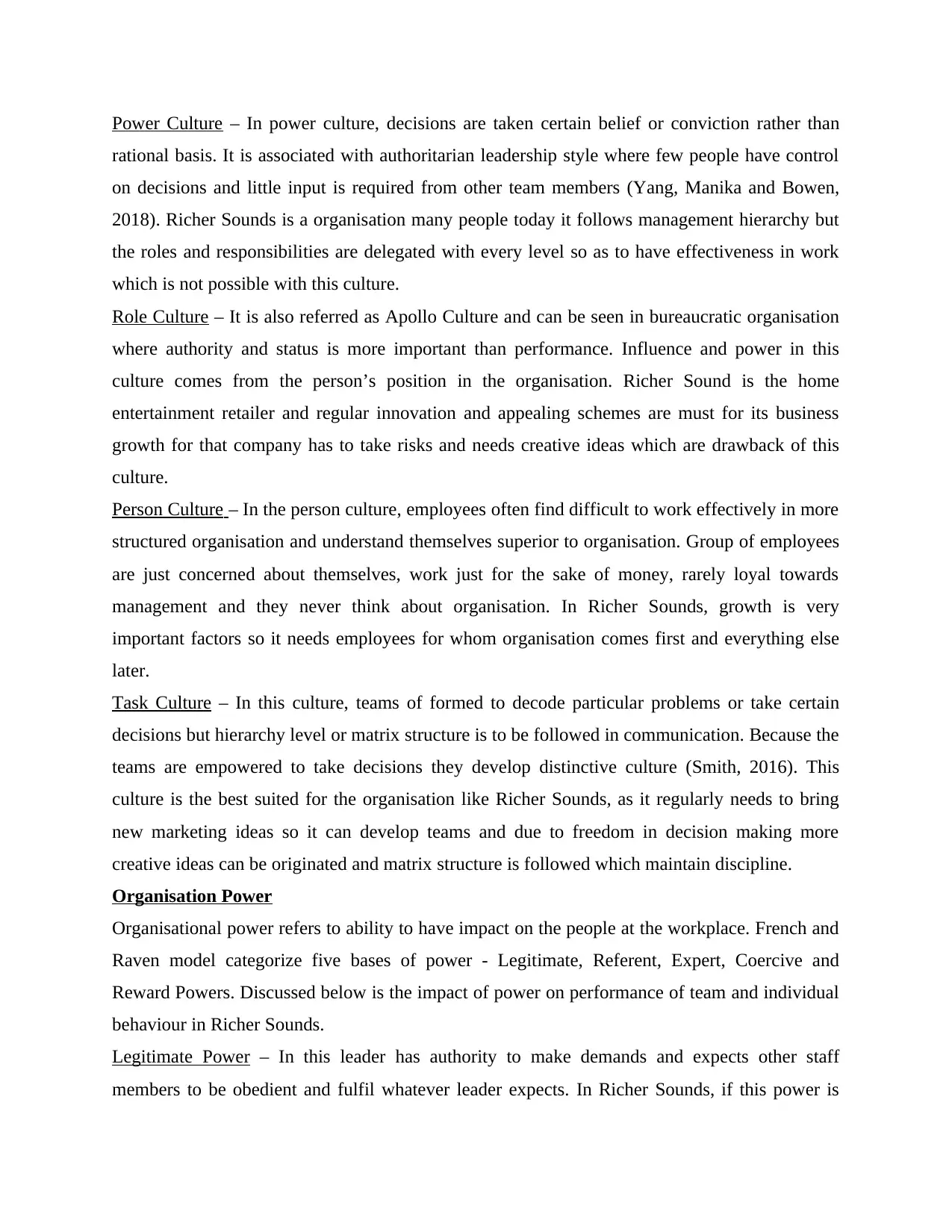
Power Culture – In power culture, decisions are taken certain belief or conviction rather than
rational basis. It is associated with authoritarian leadership style where few people have control
on decisions and little input is required from other team members (Yang, Manika and Bowen,
2018). Richer Sounds is a organisation many people today it follows management hierarchy but
the roles and responsibilities are delegated with every level so as to have effectiveness in work
which is not possible with this culture.
Role Culture – It is also referred as Apollo Culture and can be seen in bureaucratic organisation
where authority and status is more important than performance. Influence and power in this
culture comes from the person’s position in the organisation. Richer Sound is the home
entertainment retailer and regular innovation and appealing schemes are must for its business
growth for that company has to take risks and needs creative ideas which are drawback of this
culture.
Person Culture – In the person culture, employees often find difficult to work effectively in more
structured organisation and understand themselves superior to organisation. Group of employees
are just concerned about themselves, work just for the sake of money, rarely loyal towards
management and they never think about organisation. In Richer Sounds, growth is very
important factors so it needs employees for whom organisation comes first and everything else
later.
Task Culture – In this culture, teams of formed to decode particular problems or take certain
decisions but hierarchy level or matrix structure is to be followed in communication. Because the
teams are empowered to take decisions they develop distinctive culture (Smith, 2016). This
culture is the best suited for the organisation like Richer Sounds, as it regularly needs to bring
new marketing ideas so it can develop teams and due to freedom in decision making more
creative ideas can be originated and matrix structure is followed which maintain discipline.
Organisation Power
Organisational power refers to ability to have impact on the people at the workplace. French and
Raven model categorize five bases of power - Legitimate, Referent, Expert, Coercive and
Reward Powers. Discussed below is the impact of power on performance of team and individual
behaviour in Richer Sounds.
Legitimate Power – In this leader has authority to make demands and expects other staff
members to be obedient and fulfil whatever leader expects. In Richer Sounds, if this power is
rational basis. It is associated with authoritarian leadership style where few people have control
on decisions and little input is required from other team members (Yang, Manika and Bowen,
2018). Richer Sounds is a organisation many people today it follows management hierarchy but
the roles and responsibilities are delegated with every level so as to have effectiveness in work
which is not possible with this culture.
Role Culture – It is also referred as Apollo Culture and can be seen in bureaucratic organisation
where authority and status is more important than performance. Influence and power in this
culture comes from the person’s position in the organisation. Richer Sound is the home
entertainment retailer and regular innovation and appealing schemes are must for its business
growth for that company has to take risks and needs creative ideas which are drawback of this
culture.
Person Culture – In the person culture, employees often find difficult to work effectively in more
structured organisation and understand themselves superior to organisation. Group of employees
are just concerned about themselves, work just for the sake of money, rarely loyal towards
management and they never think about organisation. In Richer Sounds, growth is very
important factors so it needs employees for whom organisation comes first and everything else
later.
Task Culture – In this culture, teams of formed to decode particular problems or take certain
decisions but hierarchy level or matrix structure is to be followed in communication. Because the
teams are empowered to take decisions they develop distinctive culture (Smith, 2016). This
culture is the best suited for the organisation like Richer Sounds, as it regularly needs to bring
new marketing ideas so it can develop teams and due to freedom in decision making more
creative ideas can be originated and matrix structure is followed which maintain discipline.
Organisation Power
Organisational power refers to ability to have impact on the people at the workplace. French and
Raven model categorize five bases of power - Legitimate, Referent, Expert, Coercive and
Reward Powers. Discussed below is the impact of power on performance of team and individual
behaviour in Richer Sounds.
Legitimate Power – In this leader has authority to make demands and expects other staff
members to be obedient and fulfil whatever leader expects. In Richer Sounds, if this power is
Paraphrase This Document
Need a fresh take? Get an instant paraphrase of this document with our AI Paraphraser
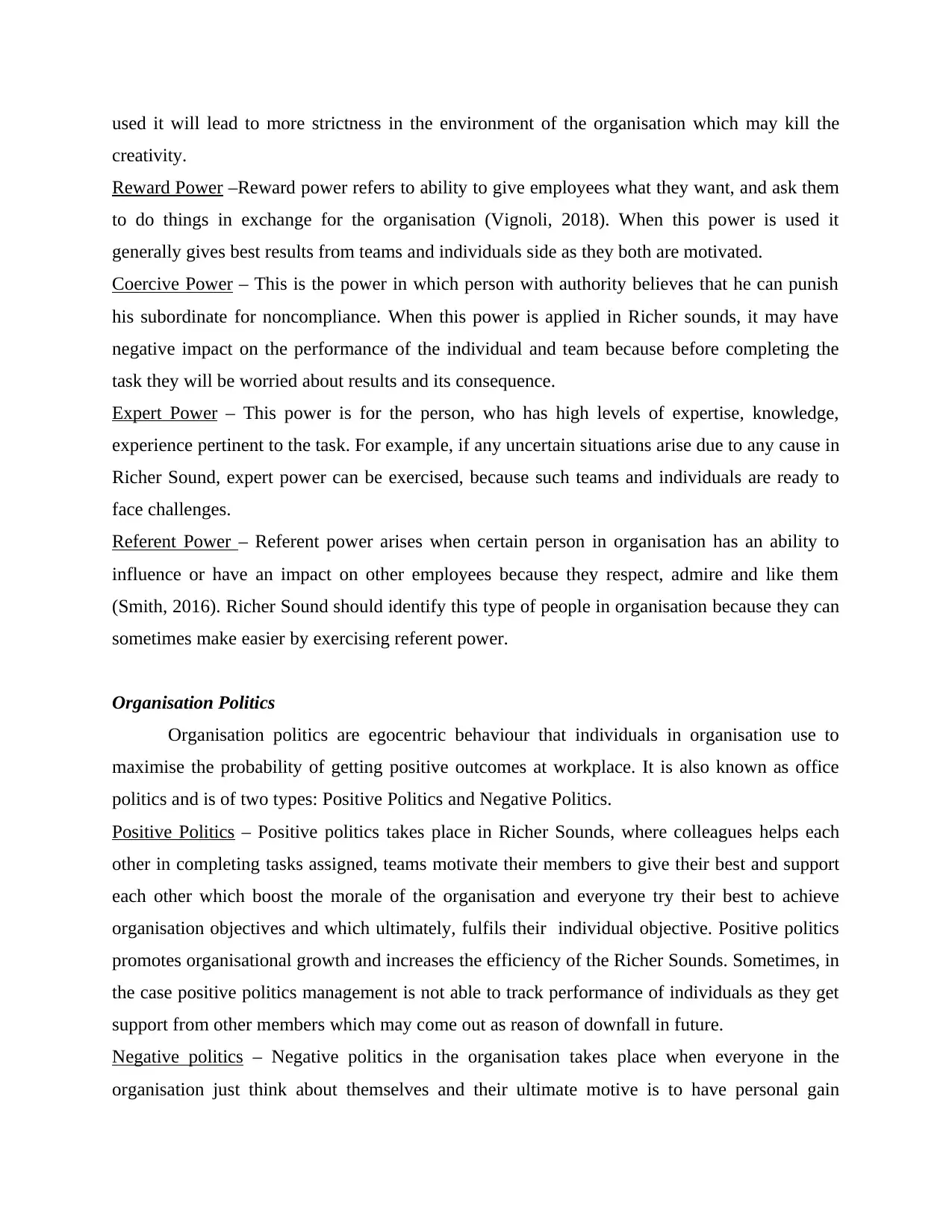
used it will lead to more strictness in the environment of the organisation which may kill the
creativity.
Reward Power –Reward power refers to ability to give employees what they want, and ask them
to do things in exchange for the organisation (Vignoli, 2018). When this power is used it
generally gives best results from teams and individuals side as they both are motivated.
Coercive Power – This is the power in which person with authority believes that he can punish
his subordinate for noncompliance. When this power is applied in Richer sounds, it may have
negative impact on the performance of the individual and team because before completing the
task they will be worried about results and its consequence.
Expert Power – This power is for the person, who has high levels of expertise, knowledge,
experience pertinent to the task. For example, if any uncertain situations arise due to any cause in
Richer Sound, expert power can be exercised, because such teams and individuals are ready to
face challenges.
Referent Power – Referent power arises when certain person in organisation has an ability to
influence or have an impact on other employees because they respect, admire and like them
(Smith, 2016). Richer Sound should identify this type of people in organisation because they can
sometimes make easier by exercising referent power.
Organisation Politics
Organisation politics are egocentric behaviour that individuals in organisation use to
maximise the probability of getting positive outcomes at workplace. It is also known as office
politics and is of two types: Positive Politics and Negative Politics.
Positive Politics – Positive politics takes place in Richer Sounds, where colleagues helps each
other in completing tasks assigned, teams motivate their members to give their best and support
each other which boost the morale of the organisation and everyone try their best to achieve
organisation objectives and which ultimately, fulfils their individual objective. Positive politics
promotes organisational growth and increases the efficiency of the Richer Sounds. Sometimes, in
the case positive politics management is not able to track performance of individuals as they get
support from other members which may come out as reason of downfall in future.
Negative politics – Negative politics in the organisation takes place when everyone in the
organisation just think about themselves and their ultimate motive is to have personal gain
creativity.
Reward Power –Reward power refers to ability to give employees what they want, and ask them
to do things in exchange for the organisation (Vignoli, 2018). When this power is used it
generally gives best results from teams and individuals side as they both are motivated.
Coercive Power – This is the power in which person with authority believes that he can punish
his subordinate for noncompliance. When this power is applied in Richer sounds, it may have
negative impact on the performance of the individual and team because before completing the
task they will be worried about results and its consequence.
Expert Power – This power is for the person, who has high levels of expertise, knowledge,
experience pertinent to the task. For example, if any uncertain situations arise due to any cause in
Richer Sound, expert power can be exercised, because such teams and individuals are ready to
face challenges.
Referent Power – Referent power arises when certain person in organisation has an ability to
influence or have an impact on other employees because they respect, admire and like them
(Smith, 2016). Richer Sound should identify this type of people in organisation because they can
sometimes make easier by exercising referent power.
Organisation Politics
Organisation politics are egocentric behaviour that individuals in organisation use to
maximise the probability of getting positive outcomes at workplace. It is also known as office
politics and is of two types: Positive Politics and Negative Politics.
Positive Politics – Positive politics takes place in Richer Sounds, where colleagues helps each
other in completing tasks assigned, teams motivate their members to give their best and support
each other which boost the morale of the organisation and everyone try their best to achieve
organisation objectives and which ultimately, fulfils their individual objective. Positive politics
promotes organisational growth and increases the efficiency of the Richer Sounds. Sometimes, in
the case positive politics management is not able to track performance of individuals as they get
support from other members which may come out as reason of downfall in future.
Negative politics – Negative politics in the organisation takes place when everyone in the
organisation just think about themselves and their ultimate motive is to have personal gain
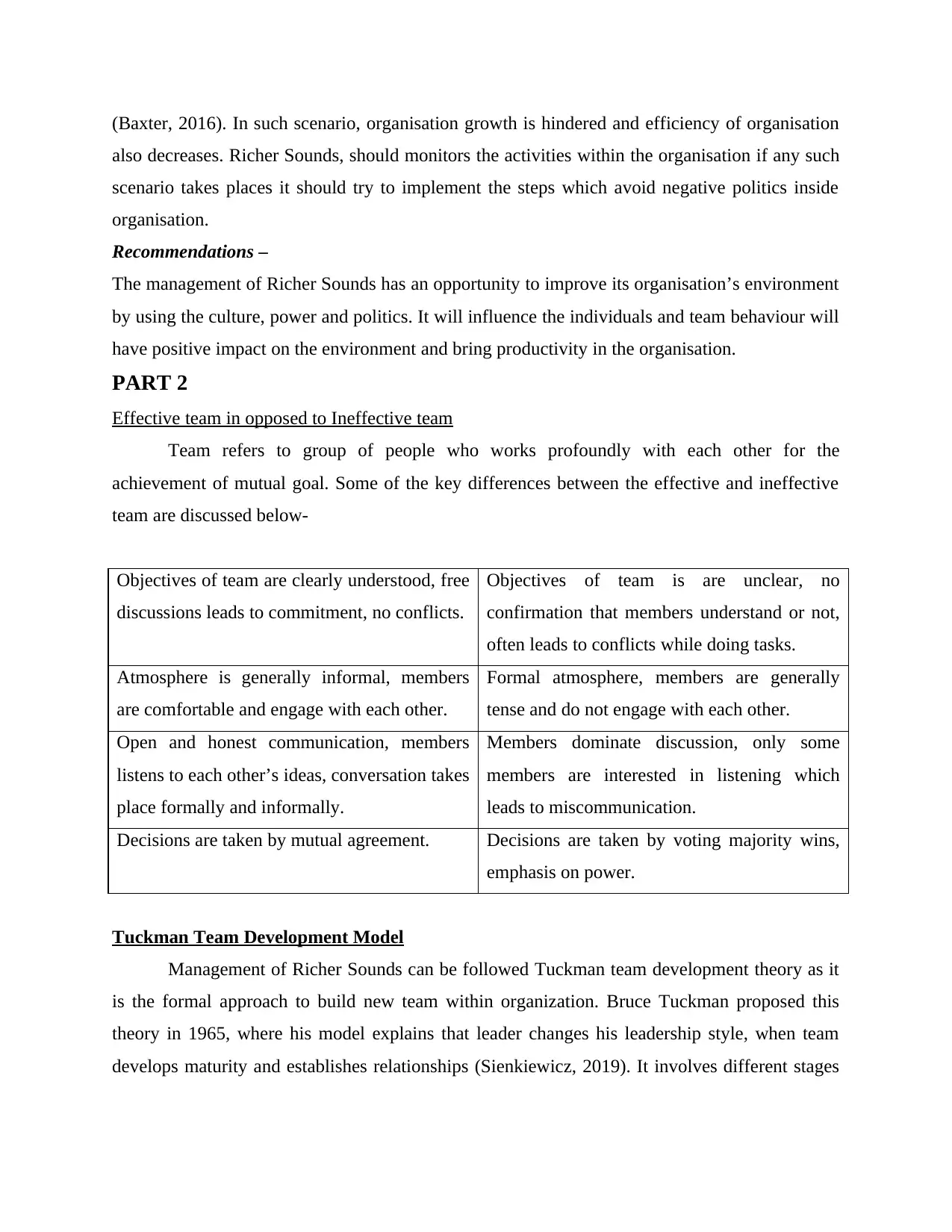
(Baxter, 2016). In such scenario, organisation growth is hindered and efficiency of organisation
also decreases. Richer Sounds, should monitors the activities within the organisation if any such
scenario takes places it should try to implement the steps which avoid negative politics inside
organisation.
Recommendations –
The management of Richer Sounds has an opportunity to improve its organisation’s environment
by using the culture, power and politics. It will influence the individuals and team behaviour will
have positive impact on the environment and bring productivity in the organisation.
PART 2
Effective team in opposed to Ineffective team
Team refers to group of people who works profoundly with each other for the
achievement of mutual goal. Some of the key differences between the effective and ineffective
team are discussed below-
Objectives of team are clearly understood, free
discussions leads to commitment, no conflicts.
Objectives of team is are unclear, no
confirmation that members understand or not,
often leads to conflicts while doing tasks.
Atmosphere is generally informal, members
are comfortable and engage with each other.
Formal atmosphere, members are generally
tense and do not engage with each other.
Open and honest communication, members
listens to each other’s ideas, conversation takes
place formally and informally.
Members dominate discussion, only some
members are interested in listening which
leads to miscommunication.
Decisions are taken by mutual agreement. Decisions are taken by voting majority wins,
emphasis on power.
Tuckman Team Development Model
Management of Richer Sounds can be followed Tuckman team development theory as it
is the formal approach to build new team within organization. Bruce Tuckman proposed this
theory in 1965, where his model explains that leader changes his leadership style, when team
develops maturity and establishes relationships (Sienkiewicz, 2019). It involves different stages
also decreases. Richer Sounds, should monitors the activities within the organisation if any such
scenario takes places it should try to implement the steps which avoid negative politics inside
organisation.
Recommendations –
The management of Richer Sounds has an opportunity to improve its organisation’s environment
by using the culture, power and politics. It will influence the individuals and team behaviour will
have positive impact on the environment and bring productivity in the organisation.
PART 2
Effective team in opposed to Ineffective team
Team refers to group of people who works profoundly with each other for the
achievement of mutual goal. Some of the key differences between the effective and ineffective
team are discussed below-
Objectives of team are clearly understood, free
discussions leads to commitment, no conflicts.
Objectives of team is are unclear, no
confirmation that members understand or not,
often leads to conflicts while doing tasks.
Atmosphere is generally informal, members
are comfortable and engage with each other.
Formal atmosphere, members are generally
tense and do not engage with each other.
Open and honest communication, members
listens to each other’s ideas, conversation takes
place formally and informally.
Members dominate discussion, only some
members are interested in listening which
leads to miscommunication.
Decisions are taken by mutual agreement. Decisions are taken by voting majority wins,
emphasis on power.
Tuckman Team Development Model
Management of Richer Sounds can be followed Tuckman team development theory as it
is the formal approach to build new team within organization. Bruce Tuckman proposed this
theory in 1965, where his model explains that leader changes his leadership style, when team
develops maturity and establishes relationships (Sienkiewicz, 2019). It involves different stages
⊘ This is a preview!⊘
Do you want full access?
Subscribe today to unlock all pages.

Trusted by 1+ million students worldwide
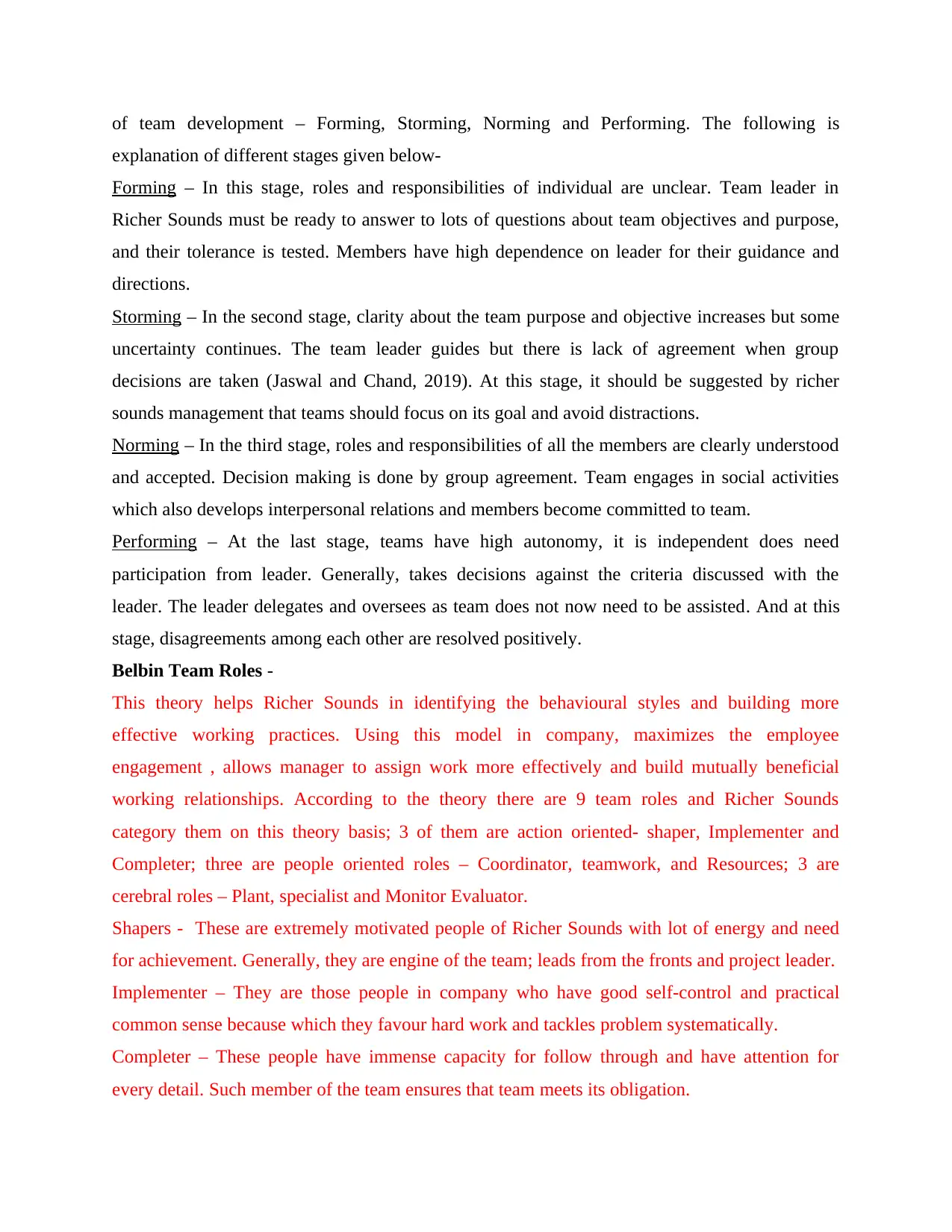
of team development – Forming, Storming, Norming and Performing. The following is
explanation of different stages given below-
Forming – In this stage, roles and responsibilities of individual are unclear. Team leader in
Richer Sounds must be ready to answer to lots of questions about team objectives and purpose,
and their tolerance is tested. Members have high dependence on leader for their guidance and
directions.
Storming – In the second stage, clarity about the team purpose and objective increases but some
uncertainty continues. The team leader guides but there is lack of agreement when group
decisions are taken (Jaswal and Chand, 2019). At this stage, it should be suggested by richer
sounds management that teams should focus on its goal and avoid distractions.
Norming – In the third stage, roles and responsibilities of all the members are clearly understood
and accepted. Decision making is done by group agreement. Team engages in social activities
which also develops interpersonal relations and members become committed to team.
Performing – At the last stage, teams have high autonomy, it is independent does need
participation from leader. Generally, takes decisions against the criteria discussed with the
leader. The leader delegates and oversees as team does not now need to be assisted. And at this
stage, disagreements among each other are resolved positively.
Belbin Team Roles -
This theory helps Richer Sounds in identifying the behavioural styles and building more
effective working practices. Using this model in company, maximizes the employee
engagement , allows manager to assign work more effectively and build mutually beneficial
working relationships. According to the theory there are 9 team roles and Richer Sounds
category them on this theory basis; 3 of them are action oriented- shaper, Implementer and
Completer; three are people oriented roles – Coordinator, teamwork, and Resources; 3 are
cerebral roles – Plant, specialist and Monitor Evaluator.
Shapers - These are extremely motivated people of Richer Sounds with lot of energy and need
for achievement. Generally, they are engine of the team; leads from the fronts and project leader.
Implementer – They are those people in company who have good self-control and practical
common sense because which they favour hard work and tackles problem systematically.
Completer – These people have immense capacity for follow through and have attention for
every detail. Such member of the team ensures that team meets its obligation.
explanation of different stages given below-
Forming – In this stage, roles and responsibilities of individual are unclear. Team leader in
Richer Sounds must be ready to answer to lots of questions about team objectives and purpose,
and their tolerance is tested. Members have high dependence on leader for their guidance and
directions.
Storming – In the second stage, clarity about the team purpose and objective increases but some
uncertainty continues. The team leader guides but there is lack of agreement when group
decisions are taken (Jaswal and Chand, 2019). At this stage, it should be suggested by richer
sounds management that teams should focus on its goal and avoid distractions.
Norming – In the third stage, roles and responsibilities of all the members are clearly understood
and accepted. Decision making is done by group agreement. Team engages in social activities
which also develops interpersonal relations and members become committed to team.
Performing – At the last stage, teams have high autonomy, it is independent does need
participation from leader. Generally, takes decisions against the criteria discussed with the
leader. The leader delegates and oversees as team does not now need to be assisted. And at this
stage, disagreements among each other are resolved positively.
Belbin Team Roles -
This theory helps Richer Sounds in identifying the behavioural styles and building more
effective working practices. Using this model in company, maximizes the employee
engagement , allows manager to assign work more effectively and build mutually beneficial
working relationships. According to the theory there are 9 team roles and Richer Sounds
category them on this theory basis; 3 of them are action oriented- shaper, Implementer and
Completer; three are people oriented roles – Coordinator, teamwork, and Resources; 3 are
cerebral roles – Plant, specialist and Monitor Evaluator.
Shapers - These are extremely motivated people of Richer Sounds with lot of energy and need
for achievement. Generally, they are engine of the team; leads from the fronts and project leader.
Implementer – They are those people in company who have good self-control and practical
common sense because which they favour hard work and tackles problem systematically.
Completer – These people have immense capacity for follow through and have attention for
every detail. Such member of the team ensures that team meets its obligation.
Paraphrase This Document
Need a fresh take? Get an instant paraphrase of this document with our AI Paraphraser
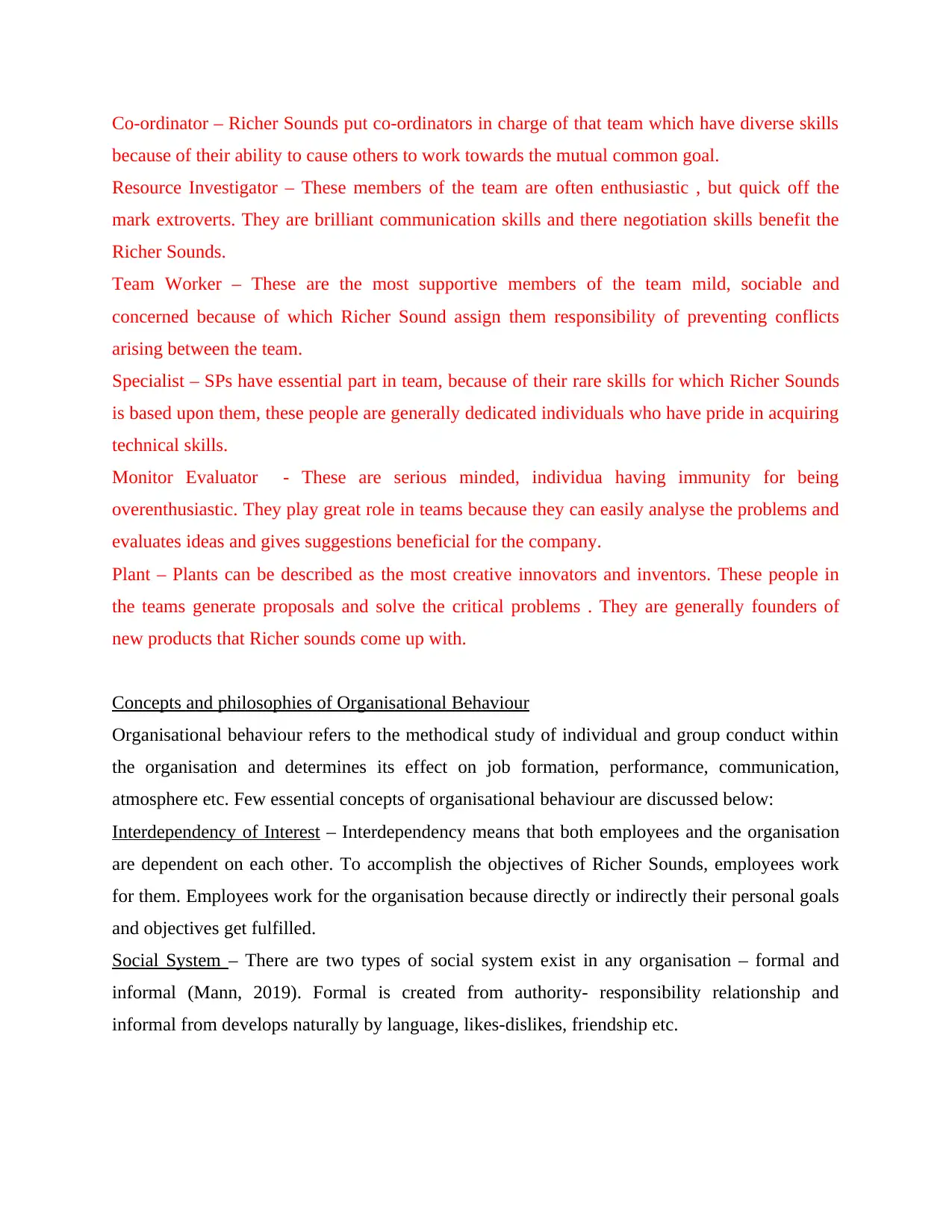
Co-ordinator – Richer Sounds put co-ordinators in charge of that team which have diverse skills
because of their ability to cause others to work towards the mutual common goal.
Resource Investigator – These members of the team are often enthusiastic , but quick off the
mark extroverts. They are brilliant communication skills and there negotiation skills benefit the
Richer Sounds.
Team Worker – These are the most supportive members of the team mild, sociable and
concerned because of which Richer Sound assign them responsibility of preventing conflicts
arising between the team.
Specialist – SPs have essential part in team, because of their rare skills for which Richer Sounds
is based upon them, these people are generally dedicated individuals who have pride in acquiring
technical skills.
Monitor Evaluator - These are serious minded, individua having immunity for being
overenthusiastic. They play great role in teams because they can easily analyse the problems and
evaluates ideas and gives suggestions beneficial for the company.
Plant – Plants can be described as the most creative innovators and inventors. These people in
the teams generate proposals and solve the critical problems . They are generally founders of
new products that Richer sounds come up with.
Concepts and philosophies of Organisational Behaviour
Organisational behaviour refers to the methodical study of individual and group conduct within
the organisation and determines its effect on job formation, performance, communication,
atmosphere etc. Few essential concepts of organisational behaviour are discussed below:
Interdependency of Interest – Interdependency means that both employees and the organisation
are dependent on each other. To accomplish the objectives of Richer Sounds, employees work
for them. Employees work for the organisation because directly or indirectly their personal goals
and objectives get fulfilled.
Social System – There are two types of social system exist in any organisation – formal and
informal (Mann, 2019). Formal is created from authority- responsibility relationship and
informal from develops naturally by language, likes-dislikes, friendship etc.
because of their ability to cause others to work towards the mutual common goal.
Resource Investigator – These members of the team are often enthusiastic , but quick off the
mark extroverts. They are brilliant communication skills and there negotiation skills benefit the
Richer Sounds.
Team Worker – These are the most supportive members of the team mild, sociable and
concerned because of which Richer Sound assign them responsibility of preventing conflicts
arising between the team.
Specialist – SPs have essential part in team, because of their rare skills for which Richer Sounds
is based upon them, these people are generally dedicated individuals who have pride in acquiring
technical skills.
Monitor Evaluator - These are serious minded, individua having immunity for being
overenthusiastic. They play great role in teams because they can easily analyse the problems and
evaluates ideas and gives suggestions beneficial for the company.
Plant – Plants can be described as the most creative innovators and inventors. These people in
the teams generate proposals and solve the critical problems . They are generally founders of
new products that Richer sounds come up with.
Concepts and philosophies of Organisational Behaviour
Organisational behaviour refers to the methodical study of individual and group conduct within
the organisation and determines its effect on job formation, performance, communication,
atmosphere etc. Few essential concepts of organisational behaviour are discussed below:
Interdependency of Interest – Interdependency means that both employees and the organisation
are dependent on each other. To accomplish the objectives of Richer Sounds, employees work
for them. Employees work for the organisation because directly or indirectly their personal goals
and objectives get fulfilled.
Social System – There are two types of social system exist in any organisation – formal and
informal (Mann, 2019). Formal is created from authority- responsibility relationship and
informal from develops naturally by language, likes-dislikes, friendship etc.
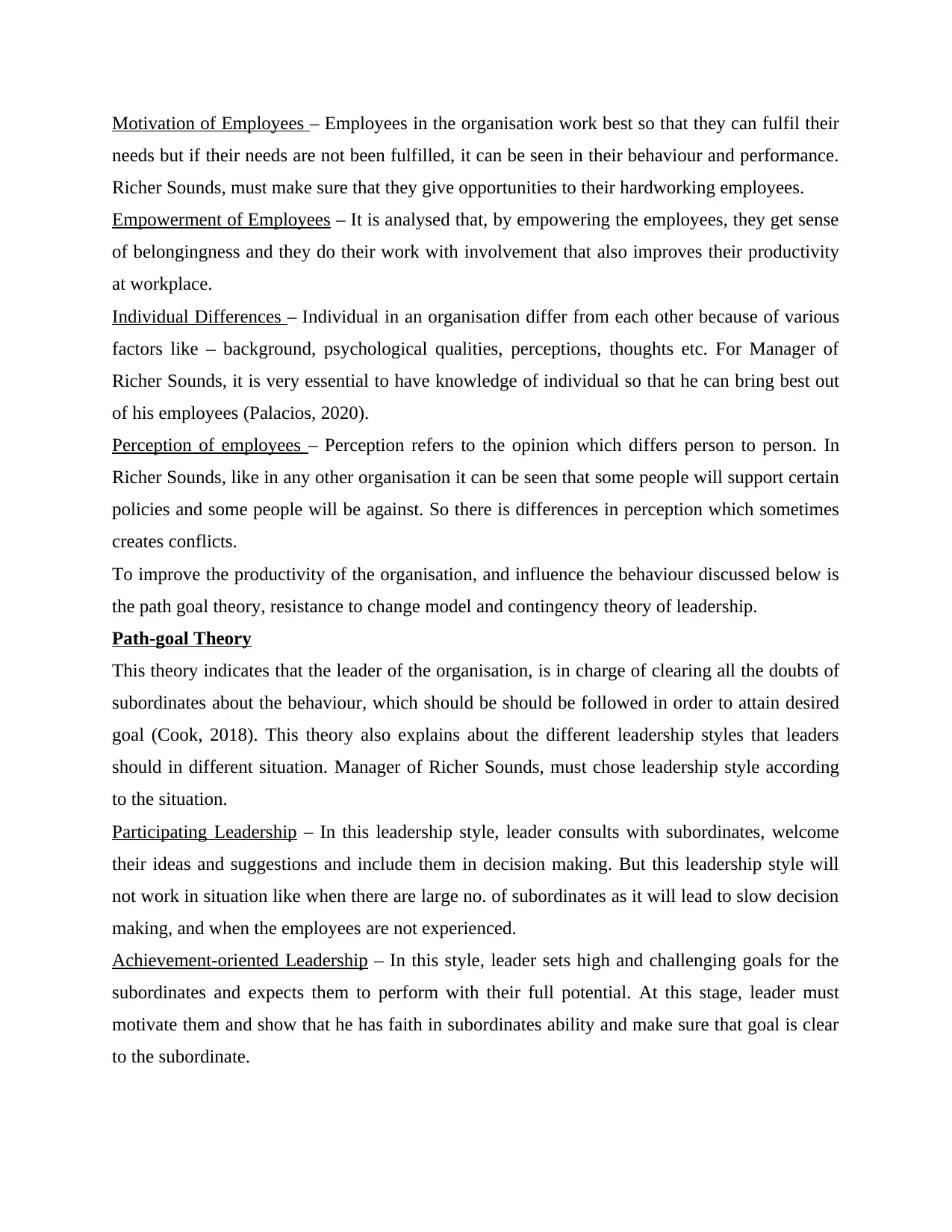
Motivation of Employees – Employees in the organisation work best so that they can fulfil their
needs but if their needs are not been fulfilled, it can be seen in their behaviour and performance.
Richer Sounds, must make sure that they give opportunities to their hardworking employees.
Empowerment of Employees – It is analysed that, by empowering the employees, they get sense
of belongingness and they do their work with involvement that also improves their productivity
at workplace.
Individual Differences – Individual in an organisation differ from each other because of various
factors like – background, psychological qualities, perceptions, thoughts etc. For Manager of
Richer Sounds, it is very essential to have knowledge of individual so that he can bring best out
of his employees (Palacios, 2020).
Perception of employees – Perception refers to the opinion which differs person to person. In
Richer Sounds, like in any other organisation it can be seen that some people will support certain
policies and some people will be against. So there is differences in perception which sometimes
creates conflicts.
To improve the productivity of the organisation, and influence the behaviour discussed below is
the path goal theory, resistance to change model and contingency theory of leadership.
Path-goal Theory
This theory indicates that the leader of the organisation, is in charge of clearing all the doubts of
subordinates about the behaviour, which should be should be followed in order to attain desired
goal (Cook, 2018). This theory also explains about the different leadership styles that leaders
should in different situation. Manager of Richer Sounds, must chose leadership style according
to the situation.
Participating Leadership – In this leadership style, leader consults with subordinates, welcome
their ideas and suggestions and include them in decision making. But this leadership style will
not work in situation like when there are large no. of subordinates as it will lead to slow decision
making, and when the employees are not experienced.
Achievement-oriented Leadership – In this style, leader sets high and challenging goals for the
subordinates and expects them to perform with their full potential. At this stage, leader must
motivate them and show that he has faith in subordinates ability and make sure that goal is clear
to the subordinate.
needs but if their needs are not been fulfilled, it can be seen in their behaviour and performance.
Richer Sounds, must make sure that they give opportunities to their hardworking employees.
Empowerment of Employees – It is analysed that, by empowering the employees, they get sense
of belongingness and they do their work with involvement that also improves their productivity
at workplace.
Individual Differences – Individual in an organisation differ from each other because of various
factors like – background, psychological qualities, perceptions, thoughts etc. For Manager of
Richer Sounds, it is very essential to have knowledge of individual so that he can bring best out
of his employees (Palacios, 2020).
Perception of employees – Perception refers to the opinion which differs person to person. In
Richer Sounds, like in any other organisation it can be seen that some people will support certain
policies and some people will be against. So there is differences in perception which sometimes
creates conflicts.
To improve the productivity of the organisation, and influence the behaviour discussed below is
the path goal theory, resistance to change model and contingency theory of leadership.
Path-goal Theory
This theory indicates that the leader of the organisation, is in charge of clearing all the doubts of
subordinates about the behaviour, which should be should be followed in order to attain desired
goal (Cook, 2018). This theory also explains about the different leadership styles that leaders
should in different situation. Manager of Richer Sounds, must chose leadership style according
to the situation.
Participating Leadership – In this leadership style, leader consults with subordinates, welcome
their ideas and suggestions and include them in decision making. But this leadership style will
not work in situation like when there are large no. of subordinates as it will lead to slow decision
making, and when the employees are not experienced.
Achievement-oriented Leadership – In this style, leader sets high and challenging goals for the
subordinates and expects them to perform with their full potential. At this stage, leader must
motivate them and show that he has faith in subordinates ability and make sure that goal is clear
to the subordinate.
⊘ This is a preview!⊘
Do you want full access?
Subscribe today to unlock all pages.

Trusted by 1+ million students worldwide
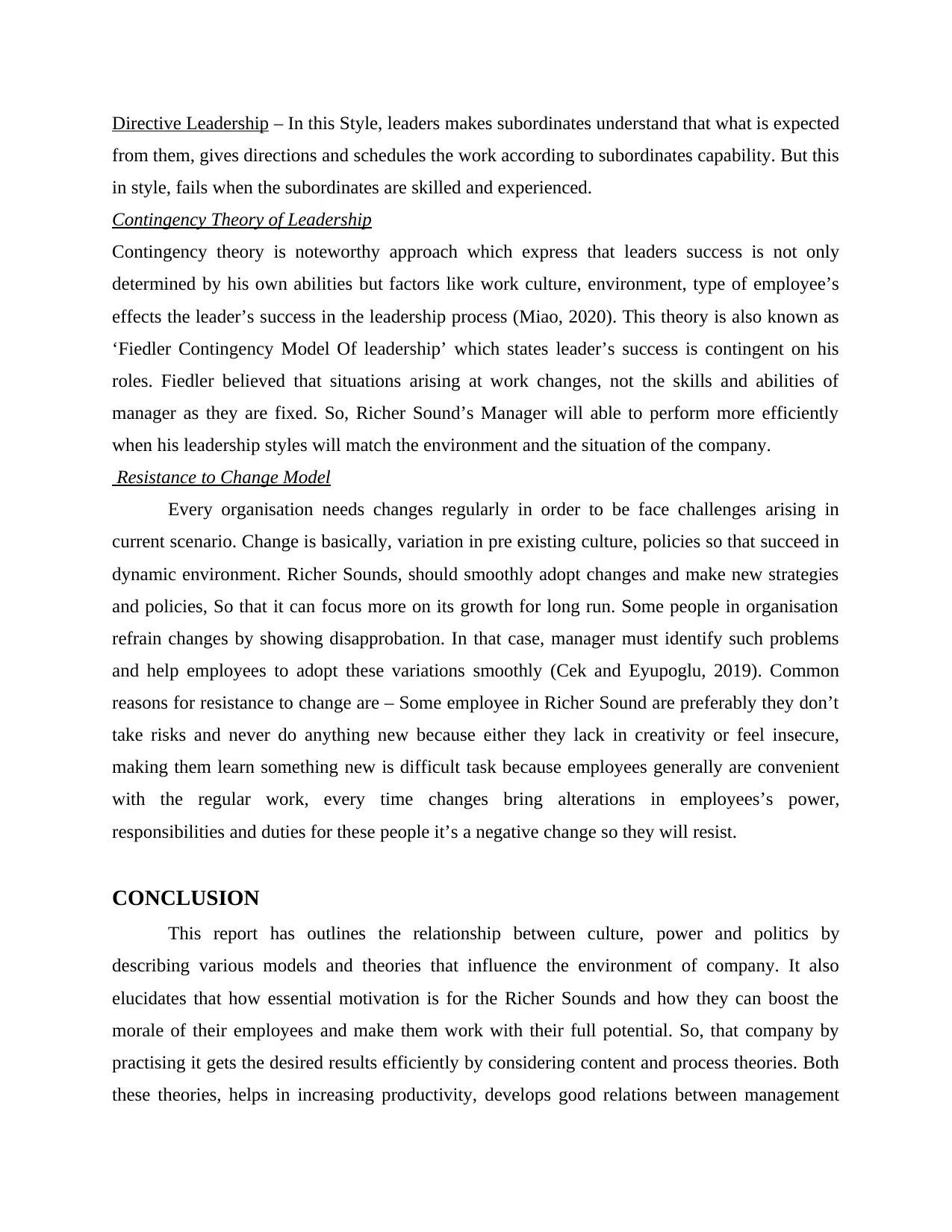
Directive Leadership – In this Style, leaders makes subordinates understand that what is expected
from them, gives directions and schedules the work according to subordinates capability. But this
in style, fails when the subordinates are skilled and experienced.
Contingency Theory of Leadership
Contingency theory is noteworthy approach which express that leaders success is not only
determined by his own abilities but factors like work culture, environment, type of employee’s
effects the leader’s success in the leadership process (Miao, 2020). This theory is also known as
‘Fiedler Contingency Model Of leadership’ which states leader’s success is contingent on his
roles. Fiedler believed that situations arising at work changes, not the skills and abilities of
manager as they are fixed. So, Richer Sound’s Manager will able to perform more efficiently
when his leadership styles will match the environment and the situation of the company.
Resistance to Change Model
Every organisation needs changes regularly in order to be face challenges arising in
current scenario. Change is basically, variation in pre existing culture, policies so that succeed in
dynamic environment. Richer Sounds, should smoothly adopt changes and make new strategies
and policies, So that it can focus more on its growth for long run. Some people in organisation
refrain changes by showing disapprobation. In that case, manager must identify such problems
and help employees to adopt these variations smoothly (Cek and Eyupoglu, 2019). Common
reasons for resistance to change are – Some employee in Richer Sound are preferably they don’t
take risks and never do anything new because either they lack in creativity or feel insecure,
making them learn something new is difficult task because employees generally are convenient
with the regular work, every time changes bring alterations in employees’s power,
responsibilities and duties for these people it’s a negative change so they will resist.
CONCLUSION
This report has outlines the relationship between culture, power and politics by
describing various models and theories that influence the environment of company. It also
elucidates that how essential motivation is for the Richer Sounds and how they can boost the
morale of their employees and make them work with their full potential. So, that company by
practising it gets the desired results efficiently by considering content and process theories. Both
these theories, helps in increasing productivity, develops good relations between management
from them, gives directions and schedules the work according to subordinates capability. But this
in style, fails when the subordinates are skilled and experienced.
Contingency Theory of Leadership
Contingency theory is noteworthy approach which express that leaders success is not only
determined by his own abilities but factors like work culture, environment, type of employee’s
effects the leader’s success in the leadership process (Miao, 2020). This theory is also known as
‘Fiedler Contingency Model Of leadership’ which states leader’s success is contingent on his
roles. Fiedler believed that situations arising at work changes, not the skills and abilities of
manager as they are fixed. So, Richer Sound’s Manager will able to perform more efficiently
when his leadership styles will match the environment and the situation of the company.
Resistance to Change Model
Every organisation needs changes regularly in order to be face challenges arising in
current scenario. Change is basically, variation in pre existing culture, policies so that succeed in
dynamic environment. Richer Sounds, should smoothly adopt changes and make new strategies
and policies, So that it can focus more on its growth for long run. Some people in organisation
refrain changes by showing disapprobation. In that case, manager must identify such problems
and help employees to adopt these variations smoothly (Cek and Eyupoglu, 2019). Common
reasons for resistance to change are – Some employee in Richer Sound are preferably they don’t
take risks and never do anything new because either they lack in creativity or feel insecure,
making them learn something new is difficult task because employees generally are convenient
with the regular work, every time changes bring alterations in employees’s power,
responsibilities and duties for these people it’s a negative change so they will resist.
CONCLUSION
This report has outlines the relationship between culture, power and politics by
describing various models and theories that influence the environment of company. It also
elucidates that how essential motivation is for the Richer Sounds and how they can boost the
morale of their employees and make them work with their full potential. So, that company by
practising it gets the desired results efficiently by considering content and process theories. Both
these theories, helps in increasing productivity, develops good relations between management
Paraphrase This Document
Need a fresh take? Get an instant paraphrase of this document with our AI Paraphraser
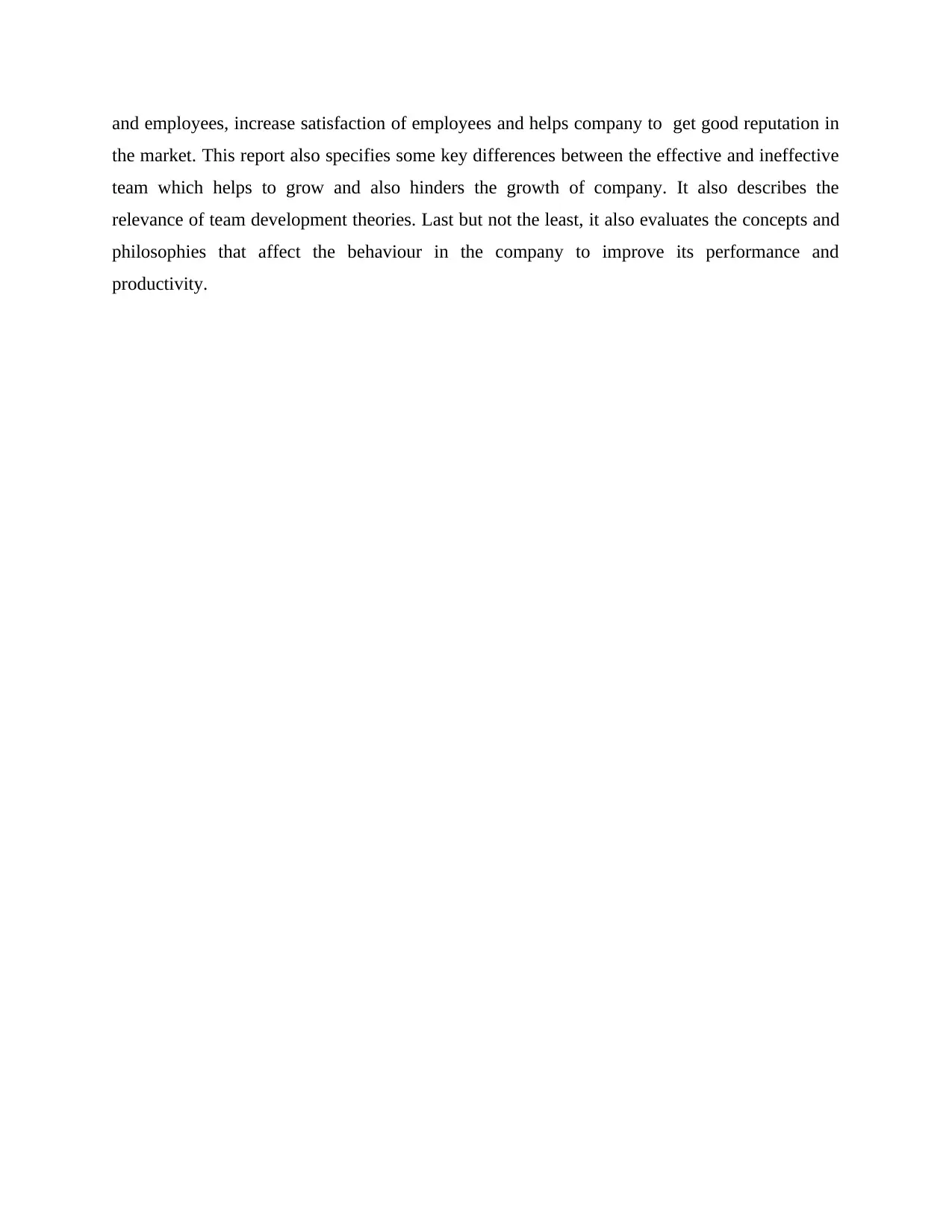
and employees, increase satisfaction of employees and helps company to get good reputation in
the market. This report also specifies some key differences between the effective and ineffective
team which helps to grow and also hinders the growth of company. It also describes the
relevance of team development theories. Last but not the least, it also evaluates the concepts and
philosophies that affect the behaviour in the company to improve its performance and
productivity.
the market. This report also specifies some key differences between the effective and ineffective
team which helps to grow and also hinders the growth of company. It also describes the
relevance of team development theories. Last but not the least, it also evaluates the concepts and
philosophies that affect the behaviour in the company to improve its performance and
productivity.
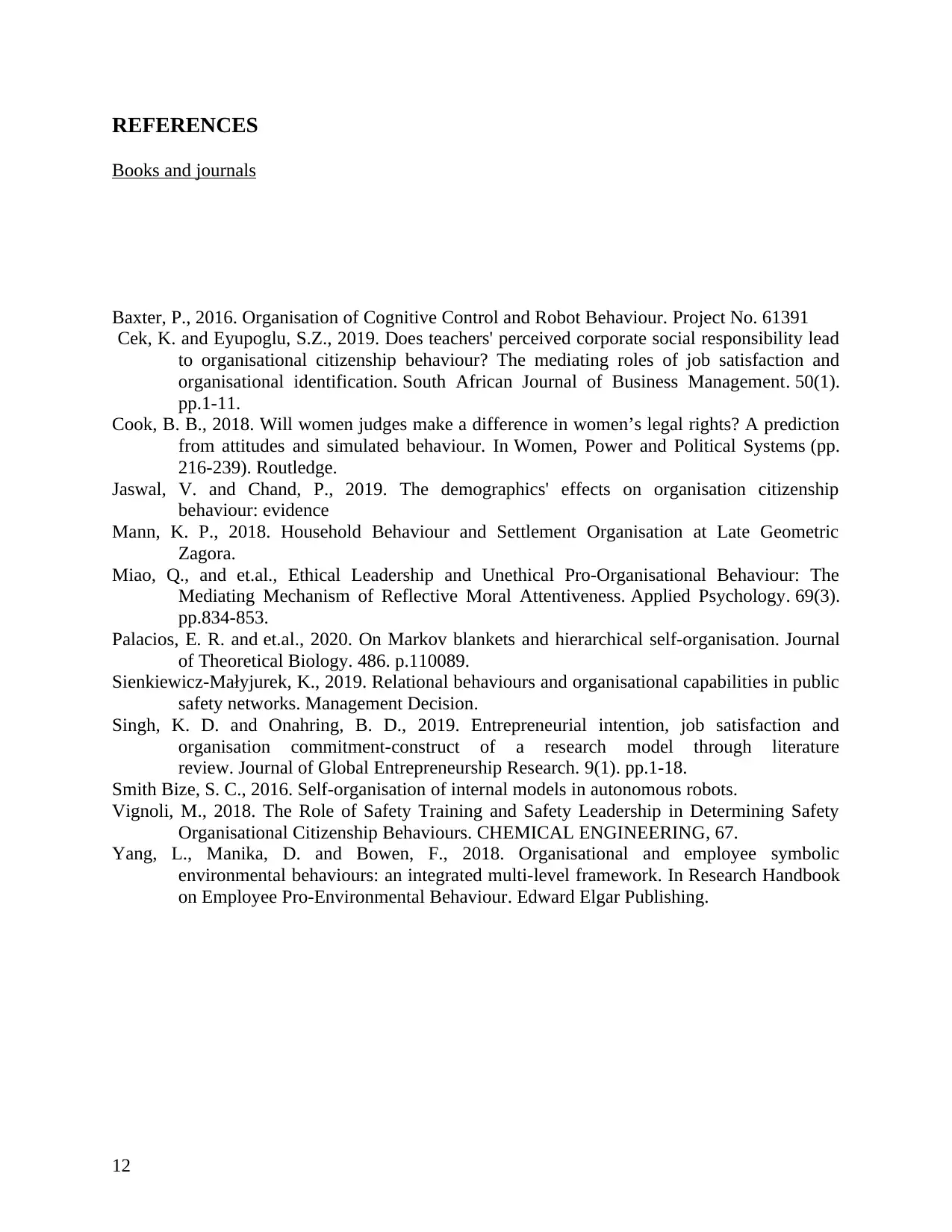
REFERENCES
Books and journals
Baxter, P., 2016. Organisation of Cognitive Control and Robot Behaviour. Project No. 61391
Cek, K. and Eyupoglu, S.Z., 2019. Does teachers' perceived corporate social responsibility lead
to organisational citizenship behaviour? The mediating roles of job satisfaction and
organisational identification. South African Journal of Business Management. 50(1).
pp.1-11.
Cook, B. B., 2018. Will women judges make a difference in women’s legal rights? A prediction
from attitudes and simulated behaviour. In Women, Power and Political Systems (pp.
216-239). Routledge.
Jaswal, V. and Chand, P., 2019. The demographics' effects on organisation citizenship
behaviour: evidence
Mann, K. P., 2018. Household Behaviour and Settlement Organisation at Late Geometric
Zagora.
Miao, Q., and et.al., Ethical Leadership and Unethical Pro‐Organisational Behaviour: The
Mediating Mechanism of Reflective Moral Attentiveness. Applied Psychology. 69(3).
pp.834-853.
Palacios, E. R. and et.al., 2020. On Markov blankets and hierarchical self-organisation. Journal
of Theoretical Biology. 486. p.110089.
Sienkiewicz-Małyjurek, K., 2019. Relational behaviours and organisational capabilities in public
safety networks. Management Decision.
Singh, K. D. and Onahring, B. D., 2019. Entrepreneurial intention, job satisfaction and
organisation commitment-construct of a research model through literature
review. Journal of Global Entrepreneurship Research. 9(1). pp.1-18.
Smith Bize, S. C., 2016. Self-organisation of internal models in autonomous robots.
Vignoli, M., 2018. The Role of Safety Training and Safety Leadership in Determining Safety
Organisational Citizenship Behaviours. CHEMICAL ENGINEERING, 67.
Yang, L., Manika, D. and Bowen, F., 2018. Organisational and employee symbolic
environmental behaviours: an integrated multi-level framework. In Research Handbook
on Employee Pro-Environmental Behaviour. Edward Elgar Publishing.
12
Books and journals
Baxter, P., 2016. Organisation of Cognitive Control and Robot Behaviour. Project No. 61391
Cek, K. and Eyupoglu, S.Z., 2019. Does teachers' perceived corporate social responsibility lead
to organisational citizenship behaviour? The mediating roles of job satisfaction and
organisational identification. South African Journal of Business Management. 50(1).
pp.1-11.
Cook, B. B., 2018. Will women judges make a difference in women’s legal rights? A prediction
from attitudes and simulated behaviour. In Women, Power and Political Systems (pp.
216-239). Routledge.
Jaswal, V. and Chand, P., 2019. The demographics' effects on organisation citizenship
behaviour: evidence
Mann, K. P., 2018. Household Behaviour and Settlement Organisation at Late Geometric
Zagora.
Miao, Q., and et.al., Ethical Leadership and Unethical Pro‐Organisational Behaviour: The
Mediating Mechanism of Reflective Moral Attentiveness. Applied Psychology. 69(3).
pp.834-853.
Palacios, E. R. and et.al., 2020. On Markov blankets and hierarchical self-organisation. Journal
of Theoretical Biology. 486. p.110089.
Sienkiewicz-Małyjurek, K., 2019. Relational behaviours and organisational capabilities in public
safety networks. Management Decision.
Singh, K. D. and Onahring, B. D., 2019. Entrepreneurial intention, job satisfaction and
organisation commitment-construct of a research model through literature
review. Journal of Global Entrepreneurship Research. 9(1). pp.1-18.
Smith Bize, S. C., 2016. Self-organisation of internal models in autonomous robots.
Vignoli, M., 2018. The Role of Safety Training and Safety Leadership in Determining Safety
Organisational Citizenship Behaviours. CHEMICAL ENGINEERING, 67.
Yang, L., Manika, D. and Bowen, F., 2018. Organisational and employee symbolic
environmental behaviours: an integrated multi-level framework. In Research Handbook
on Employee Pro-Environmental Behaviour. Edward Elgar Publishing.
12
⊘ This is a preview!⊘
Do you want full access?
Subscribe today to unlock all pages.

Trusted by 1+ million students worldwide
1 out of 13
Related Documents
Your All-in-One AI-Powered Toolkit for Academic Success.
+13062052269
info@desklib.com
Available 24*7 on WhatsApp / Email
![[object Object]](/_next/static/media/star-bottom.7253800d.svg)
Unlock your academic potential
Copyright © 2020–2026 A2Z Services. All Rights Reserved. Developed and managed by ZUCOL.




